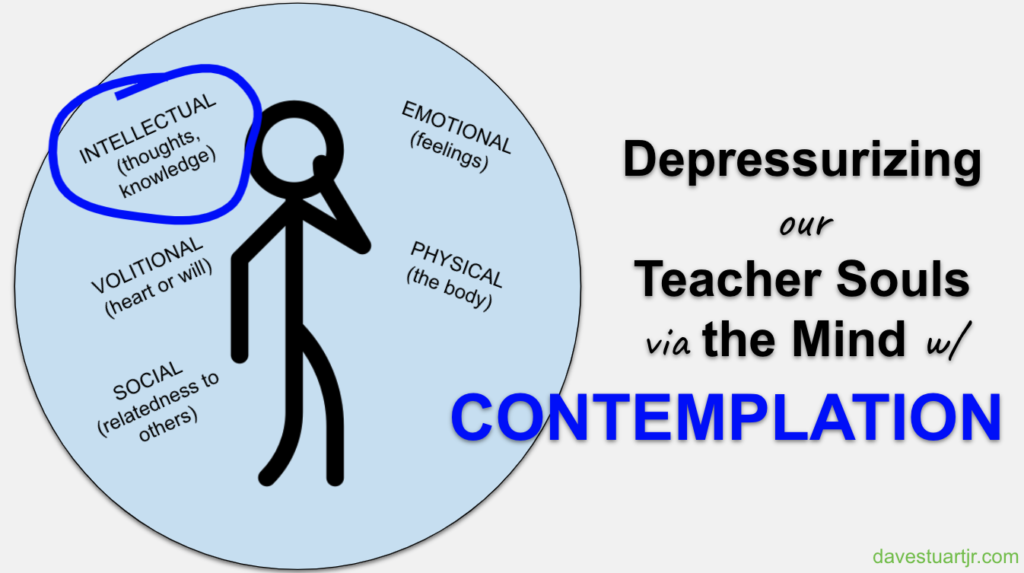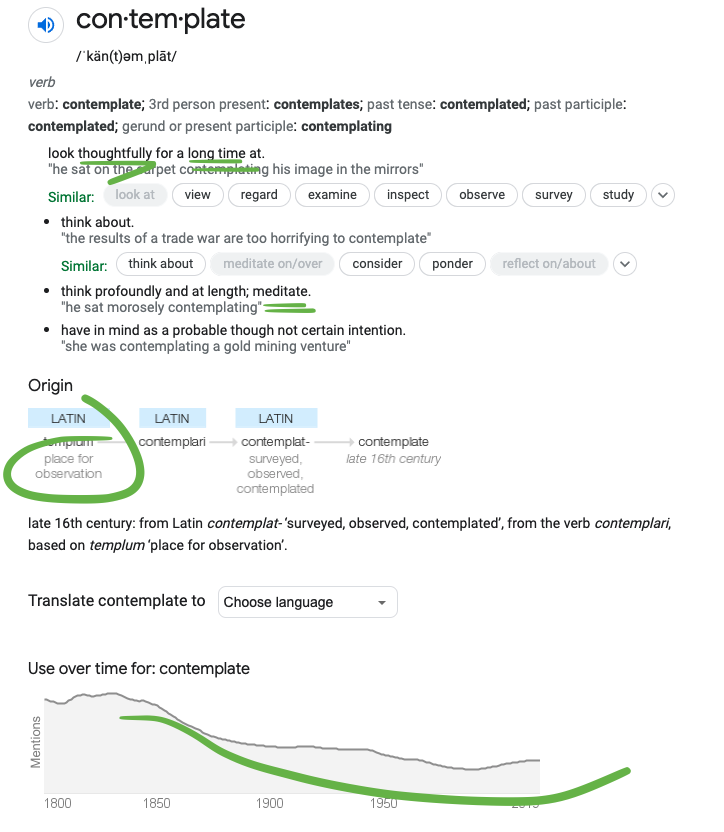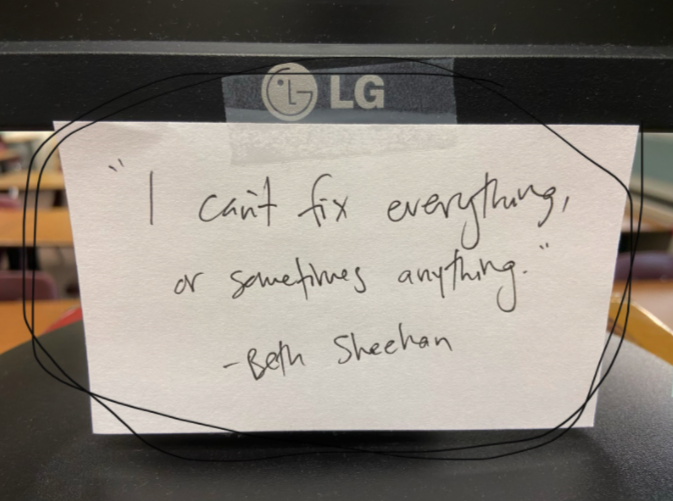Just joining us? We're in a series on depressurization methods. You can see all the posts so far right here, and I've got a whole playlist of supplementary (and brief) YouTube videos on these kinds of ideas right here.

There's this line from Dallas Willard, shortly before he died, that goes like this:
It isn't too much of an exaggeration to say that our basic freedom is where we put our mind. It's not unlimited; we can be captured by our thoughts. But our choice as to where we put our mind is what most determines where we go.
from Renovated, by Jim Wilder (p.62)
Where we put our mind = where we set our sail. Set it poorly and even ideal winds won't move us where we want to go. Set it well and even weak winds can get us moving in the right direction.
So how do we set our minds?
I think a word we don't use enough these days is contemplate. I've marked a few things of interest on Google's definition result below.

So here's the thing — even though we don't use the word, we do contemplation all the time. You and I are just contemplative creatures. Our minds meditate.
The thing is, most of us meditate on default. We look thoughtfully at length at thoughts that others present to us, or that occur to us spontaneously. And so we can end up going through our days of teaching ruminating on ideas like:
- I'm so bad at this job.
- This job is impossible.
- These students are so mean.
- That colleague doesn't like me.
- It just is what it is.
And sometimes, these thoughts might be true — that colleague may actually not like us! In this case, it really might just be what it is, and there may be nothing we can do to change that.
But the question is: does reflecting at length on thoughts like these get us where we're trying to go? Does it increase pressure to my burdened soul or does it relieve it?
How Toni Morrison's dad changed the course of her working life in a single conversation
There's this beautiful short essay in The New Yorker where Toni Morrison writes about a bad job she had as an adolescent and about how her dad changed her mindset with just a few short words. I describe the moment in the video below starting at 1:48, and the complete essay by Morrison is here.
What did Toni's dad say? “Listen. You don’t live there. You live here. With your people. Go to work. Get your money. And come on home.” And what Toni took away from that were thoughts that she contemplated for the rest of her life. Those thoughts were:
- Whatever the work is, do it well—not for the boss but for yourself.
- You make the job; it doesn’t make you.
- Your real life is with us, your family.
- You are not the work you do; you are the person you are.
Notice the empowerment that comes from meditating on these ideas — the agency, the freedom, the safety. Morrison concludes her essay by saying that in all her jobs since that conversation with her father, “I have never considered the level of labor to be the measure of myself, and I have never placed the security of a job above the value of home.”
I mean, it explodes my head and my heart. Why? Because the person writing this went on to become one of the most accomplished writers of the last century.
What we choose to contemplate shapes where we go.
I'm not saying how we think solves everything
It goes without saying, but just to be sure: you can't change reality just by thinking nice thoughts. We're not brains on sticks. Many circumstances require action and voice.
But in an age where expression is cheap and outrage is plentiful, intentional contemplation is radically under-rated. Willard is right: How we experience and engage with reality is hugely shaped by how we think about it. Look at Viktor Frankl; look at Toni Morrison.
How to do contemplation at school:
Write a worthy thought on an index card and place it someplace prominent.
During COVID, a colleague wrote to me about a line that she was contemplating. I loved it instantly, wrote it down on an index card, and placed it beneath my monitor.

Here are some other worthy thoughts I've index carded over the years:
- I am not my job.
- This work is not my life.
- Someday I'll be old looking back on this.
- Failure = progress (if I try to learn from it).
- I promote long-term flourishing — I can't guarantee it.
Here are some thoughts that I've discarded over the years — these are intellectual pressure cookers:
- I must be the best.
- My students deserve the best.
- I can't fail.
Have a book to read each day that's not about teaching.
Do it for five minutes or so. What you want is a book that's going to give you good things to think, like Toni Morrison's dad did for her.
(I made this list of books that rock.)
Watch one of these per day and write down one thought you want to think on.
I've created a whole “Thoughts Worth Thinkin'” video series right here.
How to do it at home:
Really, do the same as above, except…
Sometimes, take a walk with just your index card.
Don't stress yourself out on the walk trying to repeat the index card's phrase a thousand times. Just walk with only it in your hand. Periodically look at it and think on it.
Sometimes, take a walk listening to a short passage on repeat.
I really like the Dwell app for listening to Scripture passages on repeat. But you could do something similar with YouTube readings, podcasts, or audio books of your choosing.
Read stuff unrelated to teaching when you're at home — stuff that interests you or stuff that's been recommended by folks you respect.
Again, this is my list of recommendations.
As always: enjoy the process.
You and I are cerebral creatures. What we think on shapes where we go. Let's think depressurizing thoughts. [1] [2]
Dig Deeper:
- Got so much work that you don't have time for this practice? Try the following posts on making workload behave:
- A Shift then a Skip: Here's How One Teacher's Job Changed with a Simple Change in Thinking
- How to Get Better at Satisficing as an Educator
- The Best Question for Helping You Simplify Lessons, Curricula, Policies, or Procedures
- A Few Helpful Ideas for Resting as an Educator
- Let's Pick Some Sled Dogs
- We're Too Hospitable to Pointlessness
- To Decide is to Cut
- I'm currently working on a spring 2022 PD experience that's going to help with one of the biggest stressors for secondary teachers in the world today: student motivation. Want first dibs? Sign up here.
teachingismyjam2020 says
Some of the best teaching PD on the internet. Thank you, Dave, for always speaking from the heart (and from a place of research as well). I’ve benefitted immeasurably from your courses over the year, and I look forward to your posts every week. Your blog is truly a healing balm for teachers. -Laura
Dave Stuart Jr. says
This is so, so kind, Laura